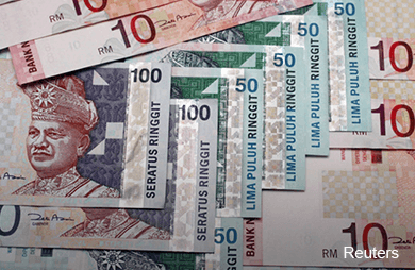
KUALA LUMPUR (Sept 25): The ringgit changed hands at 4.3856 against the US dollar today, after weakening to a new level at 4.4045 yesterday. The ringgit's depreciation came amid US interest rate hike expectation this year and 1Malaysia Development Bhd (1MDB) investigations.
The ringgit also depreciated after Bloomberg, quoting bond rating agency Moody's, reported that six developing nations including Malaysia and South Africa deserve to follow Brazil into junk status, if credit-default-swaps (CDS) traders were to be believed.
The report indicated that CDS investors were punishing other emerging markets facing similar challenges, sending their implied ratings at least five levels below their official grades, according to data from Moody’s Corp. Malaysia is A3 at the company; though traders see it six levels lower at Ba3.
Over the last one year,the ringgit had weakened to current levels from its strongest point at 3.2330 on Oct 9, 2014.
On Jan 9, 1998, the ringgit depreciated to 4.7125 against the greenback, before Bank Negara Malaysia pegged the ringgit to the US dollar at 3.8000 in September that year.
Today, economists said the ringgit's strength hinged largely on a potential US interest rate hike this year.
Reuters reported US Federal Reserve Chair Janet Yellen had in her speech yesterday, said she expected the U.S. central bank to begin raising interest rates later this year, as long as inflation remains stable and the U.S. economy is strong enough to boost employment.
MIDF Amanah Investment Bank Bhd in Malaysia, wrote in a note today: "Due to the comments by all of the Fed members, we revise our US interest rate lift-off expectation to December 2015, with 25 basis points."
"The US labour market is still fundamentally strong, with the latest initial jobless claims at 267,000, compared to the economists consensus of 271,000," MIDF said.
BofA Merrill Lynch Global Research economist Chua Hak Bin wrote in a note that the firm foresaw more risk for the ringgit, due to the high foreign ownership in Malaysian government bonds.
"More risks lie ahead. The Fed’s tightening cycle, which our US team believe will start in December this year, will likely lead to further unwinding of the high foreign ownership holdings (of about 47%) of Malaysian government bonds," Chua said.
Bank Negara Governor Tan Sri Dr Zeti Akhtar Aziz recently said the ringgit would recover, once issues relating to state-owned 1MDB were resolved.
1MDB expressed disappointment at Zeti's comment that 1MDB had been a major factor contributing to the weakening ringgit. 1MDB said the ringgit had weakened along with other curencies, amid cheaper crude oil, expectation of higher US interest rates and concerns on slower growth in emerging economies.